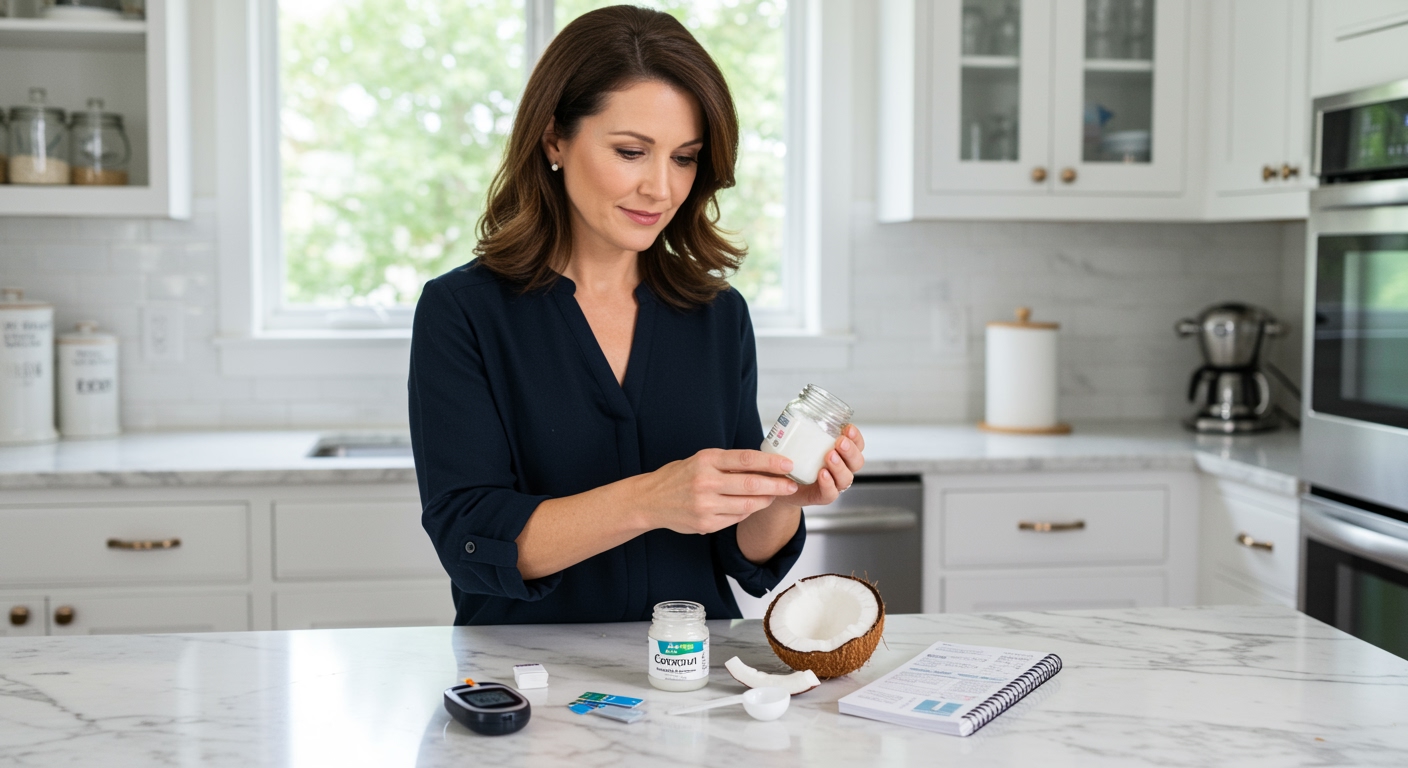✪ Key Takeaway: Coconut oil is safe for diabetes when used in moderation, but it won’t improve blood sugar control or insulin sensitivity.
Introduction
You see coconut oil everywhere these days, with claims that it can cure everything from brain fog to belly fat.
But when you have diabetes, every food choice matters more because your body processes nutrients differently than people without this condition.
Hi, I’m Abdur, your nutrition coach, and today I’m going to explain exactly how coconut oil affects your blood sugar levels and whether it belongs in your diabetes meal plan.
Does Coconut Oil Raise Blood Sugar Levels?
Coconut oil contains zero carbohydrates, which means it will not directly spike your blood glucose levels.
This makes it different from coconut meat, coconut milk, or coconut water, which all contain natural sugars that can affect your blood sugar.
Pure coconut oil is 100% fat, specifically containing about 90% saturated fatty acids.
Your body breaks down these fats through a completely different metabolic pathway than carbohydrates, so they don’t trigger the same insulin response.
However, this doesn’t mean coconut oil has no impact on your diabetes management.
Research shows that high-fat meals can slow down stomach emptying, which might actually help prevent rapid blood sugar spikes when you eat carbohydrates alongside the fat.
But this delayed digestion can also make it harder to predict exactly when your blood sugar will rise, which complicates insulin timing if you take mealtime insulin.
✪ Fact: One tablespoon of coconut oil contains 14 grams of fat and 120 calories with zero carbohydrates.
Can Coconut Oil Improve Insulin Sensitivity?
Many websites claim that coconut oil can improve insulin sensitivity, but the scientific evidence tells a different story.
Insulin sensitivity refers to how well your cells respond to insulin signals to take up glucose from your bloodstream.
Studies comparing coconut oil to other fats show that it doesn’t provide any special benefits for glucose metabolism or insulin function.
In fact, some research suggests that diets high in saturated fats, including those from coconut oil, might actually worsen insulin resistance over time.
The medium-chain triglycerides (MCTs) in coconut oil are often promoted as being metabolized differently than other fats.
While MCTs do go directly to your liver for processing instead of being stored as body fat, this doesn’t translate to better blood sugar control or improved insulin sensitivity in people with diabetes.
Your best bet for improving insulin sensitivity remains the proven strategies: regular physical activity, maintaining a healthy weight, eating plenty of fiber-rich vegetables, and following a balanced meal plan.
✪ Pro Tip: Focus on proven insulin sensitivity boosters like walking after meals rather than relying on specific oils.
What Are The Risks Of Using Coconut Oil With Diabetes?
The biggest risk of coconut oil for people with diabetes isn’t blood sugar spikes, but rather its impact on cardiovascular health.
Diabetes already increases your risk of heart disease by two to four times compared to people without diabetes.
Coconut oil is about 90% saturated fat, which can raise your LDL (bad) cholesterol levels when consumed regularly in large amounts.
High cholesterol combined with diabetes creates a dangerous combination that significantly increases your risk of heart attacks and strokes.
Another concern is the calorie density of coconut oil.
At 120 calories per tablespoon, it’s easy to consume excess calories without realizing it, which can lead to weight gain.
Extra weight makes diabetes management more difficult because it worsens insulin resistance and makes blood sugar control more challenging.
✪ Note: People with diabetes should limit saturated fat to less than 7% of total daily calories for heart health.
How Should You Use Coconut Oil If You Have Diabetes?
If you choose to use coconut oil, treat it like any other cooking fat and use it sparingly.
One to two teaspoons per day is a reasonable amount that won’t significantly impact your saturated fat intake or calorie goals.
Use coconut oil for high-heat cooking methods like sautéing or roasting vegetables, where its stability at high temperatures can be beneficial.
Avoid eating coconut oil by the spoonful or adding it to smoothies and coffee, as these practices can quickly add up to excessive calorie and saturated fat intake.
Always account for the calories from coconut oil in your daily meal plan, especially if you’re trying to manage your weight alongside your diabetes.
Consider using coconut oil as an occasional substitute for other cooking fats rather than as an addition to your current fat intake.
Remember that olive oil, avocado oil, and other unsaturated fats are better choices for your overall health when you have diabetes.
✪ Pro Tip: Measure coconut oil with measuring spoons rather than eyeballing it to control portions accurately.
The Bottom Line
Coconut oil won’t directly raise your blood sugar levels, but it also won’t provide any special benefits for diabetes management.
The best cooking oil is the one you use in moderation as part of a balanced, sustainable eating pattern, and coconut oil can fit into this approach when used occasionally and in small amounts.
I’d love to hear about your experiences with different cooking oils and how they fit into your diabetes meal plan, so please share your thoughts and questions in the comments below.
References
At NutritionCrown, we use quality and credible sources to ensure our content is accurate and trustworthy. Below are the sources referenced in creating this article:
- PubMed: Coconut Oil and Cardiovascular Disease
- PMC: Effects of Coconut Oil on Metabolic Parameters
- WebMD: Coconut Carbs and Diabetes
- Diabetes Meal Plans: Coconut Oil and Diabetes





